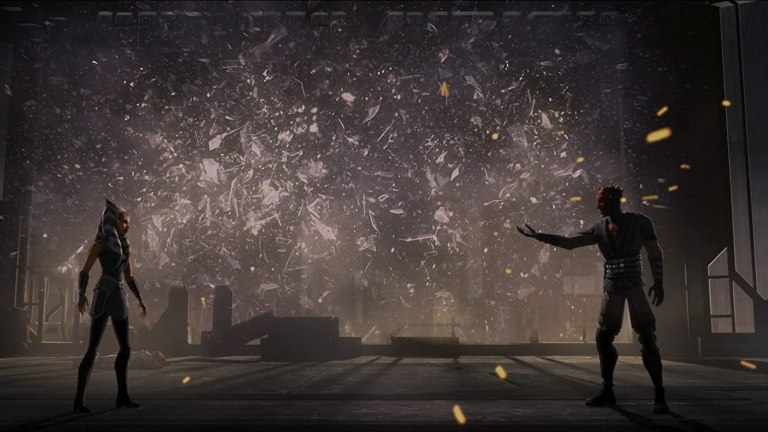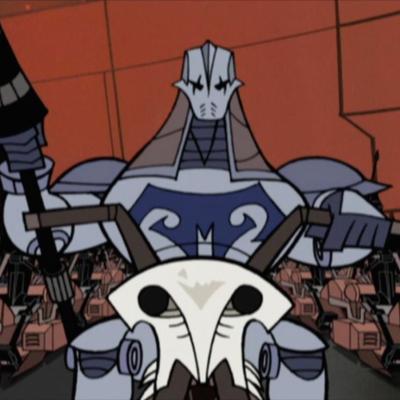What Star Wars: The Clone Wars Says About Maul and Ahsoka’s Connection
The Clone Wars season 7 finally brings Ahsoka Tano and Maul together in one of the best moments of the series. What does their duel say about their connection?

This Star Wars: The Clone Wars article contains spoilers.
The villain asking the hero to cross over to their side is a classic trope. In the lightsaber duel between Maul and Ahsoka Tano in “The Phantom Apprentice,” the penultimate episode of The Clone Wars, Ahsoka comes as close as she ever has to joining the dark side. The similarities between her and Maul at this moment make the invitation especially compelling. But she refuses for deeply ironic reasons, introducing another twist to the classic Star Wars story of good versus evil.
In the course of The Clone Wars, both Ahsoka and Maul discover that the orders they grew up in are fallible. The philosophies of the Jedi and the Sith don’t work as well when their frameworks are removed. On the eve of the Empire’s victory, everything is being rearranged, and the two outcasts have a lot to work out. “The Phantom Apprentice” explores the weight of the characters’ histories and gets to the heart of Ahsoka and Maul’s connection.
Ahsoka Tano isn’t sure she counts as a Jedi anymore. Despite leaving the Jedi Order after being falsely accused of bombing the temple in The Clone Wars season 5, what she learned as a padawan and the people she met are still fundamental to her beliefs. We see her figuring out how to balance her new life with her past in the middle arc of season 7. Unwilling to go back to the Jedi and still a wanted enemy of the Separatists, she has infinite possibilities before her and no idea where to start building another life. Her emotions are particularly raw when it comes to her teacher Anakin Skywalker, who wants her back in the fold but is too occupied with his own role in the war to be there for her at this crucial moment in her life.
Stream your Star Wars favorites on Disney+ with a FREE TRIAL, on us!
Maul too is a Sith without a hierarchy. All along he has been trying to get back into the good graces of his master, Darth Sidious, but Sidious has moved on from him. Maul was supposed to die on Naboo years ago, and now Maul knows it. Trained to both thrive on and inspire fear, Maul grabs for power because he doesn’t know how to live any other way except in the framework of the Sith and the dark side. Separated from Sidious, Maul has followed in his master’s footsteps nonetheless, operating from the shadows as a crime lord and swaying the fragile political situation on Mandalore for his own gain.

Being a crime lord isn’t what he expected to do with his life, just like Ahsoka didn’t expect to become briefly involved in spice running as she does right after she leaves the Jedi (Season 7, episodes 5-8). Both retreat to the underworld, but Ahsoka chooses not to stay there, and encourages her new friends, Trace and Rafa Martez, to stay out of trouble, too.
While Ahsoka’s Jedi morals stop her from fully joining the criminal underworld, she also learns those morals are sometimes wrong. The Martez sisters tell Ahsoka how they were orphaned after a Jedi made the split-second decision to save the lives of dozens of people over their parents. The Jedi who appeared so suddenly and violently in their lives didn’t stick around to see whether the kids were okay, instead disappearing back into the highest echelon of the city-planet, leaving them with only well-wishes about the Force that don’t have any immediate material benefit — the “thoughts and prayers” of the Star Wars universe. As Ahsoka begins to realize, this is just one of countless Clone Wars stories that show how the Jedi Order’s moral high ground is beginning to crumble. It’s not surprising, then, that Ahsoka goes to Mandalore with some doubts about her role in the war.
Ultimately, these backstories lead the two apprentices to the most important moment of The Clone Wars season 7. Maul has had a vision of Anakin turning to the dark side and becoming Sidious’ new apprentice, and he offers Ahsoka the chance to team up to take down the Sith lord and stop this all from happening, saving her master and maybe even the galaxy in the process. Maul’s advanced knowledge of the tragedy to come could be enough to change the fate of the Republic in Revenge of the Sith, but we know that Ahsoka’s choice is inevitable.
Ahsoka is driven by her specific love for Anakin as well as her Jedi ethics to refuse Maul’s offer and The Clone Wars deftly explores the consequences of that choice an episode later in “Shattered,” which covers the start of Order 66 from both of their perspectives. Early in the episode, Ahsoka hides Maul’s vision of Anakin from the Jedi Council. It’s a scene made tenser by the fact that we know Order 66 is just a few minutes from happening. Did Ahsoka have yet another chance to stop Anakin from falling to the dark side?
It’s possible Ahsoka wanted more time to mull over Maul’s information or have Maul tell the Council in person but it’s also clear that she hesitates because she doesn’t want to express doubt in Anakin. And even if she believes in the Jedi way, Ahsoka’s faith in the Order itself has been shaken to the point that she may not believe they can actually help Anakin.
“Every choice you have made has led you to this moment,” Maul says in “The Phantom Apprentice.” Even though “The Phantom Apprentice” ends with Ahsoka defeating Maul, this is really a story about failure. Both characters are people who have failed in one way or another. Maul fails to stop Sidious’ plan and Order 66, while Ahsoka fails to save the teacher she loves even as she fights for him, still believing in Anakin Skywalker’s inherent goodness. But Ahsoka doesn’t obsess over her failure like Maul does. Where Maul is never able to let go of his defeats, Ahsoka moves past her worst moments. One can imagine an alternate timeline, where Maul taught Ahsoka that to wallow was a source of strength in the dark side. Instead, she eventually comes to terms with herself and her world and gains a Jedi Master’s serenity. But that comes later.
In The Clone Wars season 7, Ahsoka and Maul are so close to turning the tide of the war. But of course, they can’t. They’re side characters who are unable to see the full picture. For all their powers, they’re just as hopeless to change the course of events as the audience members are. They’re fighting a battle they don’t know is already over. War is going to chew them up and spit them out, and all they can do now is keep the old enmity going, the old ritual: a hero fights a villain. But, no matter who wins, because of Anakin’s decisions, the galaxy is going to change without them.


